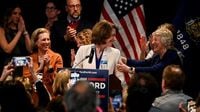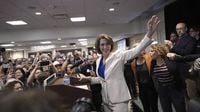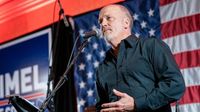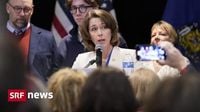In a significant judicial election in Wisconsin, the liberal judge Susan Crawford, closely aligned with the Democrats, has emerged victorious, securing a liberal majority on the state Supreme Court for another three years. This election, viewed as a crucial mood test following the first two months of Donald Trump's presidency, saw Crawford defeat her conservative opponent, Brad Schimel, with 54.2 percent of the votes compared to Schimel's nearly 46 percent, according to reports from multiple U.S. media outlets, including the Washington Post.
Crawford, who will replace the retiring liberal Justice Ann Walsh Bradley after 30 years on the bench, has a history of supporting labor unions and abortion rights. Her campaign was notably backed by Planned Parenthood and other advocates for reproductive rights, emphasizing Schimel's stance as an opponent of abortion. In contrast, Schimel's campaign attempted to portray Crawford as weak on crime and a puppet of the Democrats, asserting that her election would lead to the redrawing of electoral district boundaries to disadvantage Republicans.
The election, which has become the most expensive judicial race in U.S. history with expenditures nearing $99 million as reported by the Brennan Center for Justice, drew significant attention and voter turnout, which was over 50 percent higher than the last Supreme Court election two years prior. Trump's administration had highlighted the importance of this election due to the court's ability to influence election-related laws and resolve disputes over future election outcomes. "Wisconsin is politically a critical state, and the Supreme Court has a lot to do with elections in Wisconsin," Trump stated in the Oval Office. "Winning Wisconsin is a big deal."
Elon Musk, the tech billionaire and a key supporter of Trump, also played a substantial role in the election, traveling to Wisconsin to support Schimel. He controversially presented two voters with checks worth one million dollars each, who had signed a petition against what he termed "activist judges." Musk's involvement raised eyebrows, with critics labeling it as an attempt at illegal vote buying, a claim that was echoed by Democrats in Wisconsin.
Despite the financial backing from Musk, who reportedly invested over $20 million in Schimel's campaign, Crawford's victory sends a strong message in the current political climate. It demonstrates that even with immense financial resources, the direct purchase of elections is not guaranteed. The voters of Wisconsin have shown their resilience against attempts to undermine democratic processes through sheer financial power.
This election also marks the first significant political defeat for Trump since he took office, highlighting the ongoing tensions in U.S. politics post-2020. The outcome is particularly noteworthy given that Wisconsin is a swing state, having previously seen narrow margins in presidential elections. Kamala Harris narrowly lost to Trump in 2024, while Joe Biden had won there in 2020.
The implications of this election extend beyond the state level. The Wisconsin Supreme Court, now maintaining a liberal majority of four to three judges, is poised to make critical decisions on issues such as abortion rights and the reconfiguration of electoral districts ahead of the 2026 congressional elections. The court's rulings could significantly impact the political landscape in Wisconsin and beyond.
While the victory for Crawford is a moment of triumph for the Democrats, it does not signal an end to the challenges posed by the overwhelming influence of wealthy individuals in U.S. politics. The massive sums spent on this single judicial seat underscore the systemic issues within campaign financing, where the interests of the affluent often overshadow the voices of average citizens.
In response to the election results, Ben Wikler, the chair of the Democratic Party in Wisconsin, framed the campaign as a referendum on Musk's political influence, rallying voters against the notion of oligarchs dictating political outcomes. The Democrats' campaign against Schimel cleverly utilized the slogan "The People v. Musk," turning the election into a broader commentary on the dangers of concentrated wealth in politics.
As the dust settles on this election, both Musk and Trump face significant setbacks in their political ambitions. For Musk, this defeat marks a critical moment in his efforts to extend his influence into local politics. For Trump, the loss represents an early blow to his administration's perceived strength and control. The results from this election, combined with recent special elections in Florida, suggest a shifting public sentiment that could have lasting effects on future electoral contests.
Overall, the victory of Susan Crawford in Wisconsin illustrates the complexities of American democracy, where financial power and grassroots mobilization can collide in unpredictable ways. As the political landscape continues to evolve, the outcomes of elections like this one will be closely watched as indicators of broader trends in voter behavior and political alignment.









